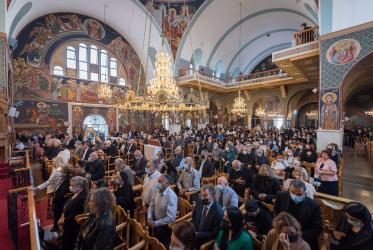Joint Working Group, 1967
The discussion in Sub-committee II is all about the "space", "climate" or "ethos" within which the ecumenical encounter takes place. The reflections in this working document of the Joint Working Group are relatively early attempts to offer guidelines for ecumenical dialogue, and they do not pretend to be polished or definitive. They are nonetheless of continued relevance, and were a part of the dossier for the JWG's meeting in May 2000 in Antelias. Participants in Sub-committee II may wish to reflect on the ways in which the WCC reflects or does not reflect these guidelines in its ethos and style of life. A useful companion piece is the JWG's document on "The Ecumenical Dialogue on Moral Issues", found in the background dossier of Sub-committee III.
Note: This paper is being published to stimulate the study of a question which everybody realises is important. We hope that it will be analyzed, discussed and criticized. Obviously it has no pretensions to laying down rules. It is far from perfect even in the eyes of the small interconfessional team that composed it, at the request of the Joint Working Group. But it has the merit of being a cooperative effort, written in a language which is not confessional, but intelligible to all Christians. As a working paper, a stimulus to personal reflection, it will be of some service. We hope readers will not hesitate to let us have their views on it. These will be passed on the JWG with a view to any future revision of the text.
"Dialogue", as a word and as a topic of discussion, is in vogue today, even though people are not always clear as to its nature, its forms or conditions. It may, therefore, be opportune to suggest a few guiding principles, especially with regard to the "ecumenical dialogue": the dialogue which concerns the Christian communions in their search for a more loyal vision of the Church's mission to the world.
1. Nature of the dialogue
Etymologically dialogue means a conversation; but a conversation with an aim: to discover the truth. All dialogue involves an exchange, an interplay between speaking and suggesting on the one hand and listening and receiving on the other. Dialogue is, therefore, the opposite of monologue. It requires reciprocity and a certain equality; it is without prejudice to each participant's personal conviction that his communion is more authentic or closer to the truth. It merely supposes that he shall not ask the other party in advance to share this conviction, but allow that he also has something to say, questions to raise, so that by give and take we can go forward towards realizing God's will for His people.
Dialogue is not merely "discourse". It is primarily a way of being together in charity, which gradually changes and renews the atmosphere essential for a joint profession of faith; where profound exchanges of thought and expression can achieve something which goes beyond clarity of conversation or individual conviction.
The ecumenical dialogue is not an end in itself. It is not an academic exercise. Its aim is to grow together in koinonia. [This Greek word is here used in the general sense of fraternal association, or fellowship, not the special sense of "full communion"]. It must, more or less from the start, aim at findings from which conclusions will be drawn and seek (but neither too easily nor too hastily) to discover points of convergence, it being understood that unity in essentials is not synonymous with uniformity in everything.
But dialogue is not merely nor primarily the activity of Churches meeting and encountering one another in order to advance towards unity. Dialogue is also (perhaps above all) a continuous mutual exchange and enrichment which springs from an effort to cooperate, in order to undertake together everything that we are not obliged to do separately.
Dialogue is not a confrontation between Churches which are concerned about their own positions and their own structures. It is their meeting and collaboration in a common task, an effort to bear joint witness, a desire to obey the Lord whose Will it is that they should be one so that the world may believe.
2. Basis or common reference
Dialogue is appropriate to a situation where differences (or even opposition) exist between men who have nevertheless certain common ground, and who aim at greater fellowship in thought and action. At the outset it assumes the existence of some common points of reference and a common orientation.
Our common reference is Revelation as expressed in the witness of the Holy Scriptures. These are something more than a mere book or set of regulations. Through them we hear the Word of God. Their witness is centred in Jesus Christ and has meaning through relation to him; it is lived and understood through the action of the Holy Spirit in the tradition of the Church and through the faithfulness of God's People. All the Christian communions are bound by this faithfulness; each gives it a concrete form in its Confession or Confessions of faith and through its spirituality.
The World Council of Churches forms a framework for dialogue between its own members - based on the revised formulation of its Basis' at the New Delhi Assembly in 1961. It has also given to the dialogue certain expressions, such as that in the document "The Unity that we seek".
Our common reference must be an experienced reality, and as such it calls us to seek to "attain to the unity inherent in our faith and our knowledge of the Son of God - to mature manhood, measured by nothing less than the full stature of Christ" (Eph. 4, 13: New English Bible). Thus the convergence which dialogue aims at establishing, on the basis of our common reference, is not merely "horizontal", reached through agreement on common formulas at the end of a theological discussion. It is essentially vertical and alive, and proceeds from the commitment of all in the loyal service of their common Lord.
It is in our desire to manifest Christ's love for the world that we realize more keenly what we really have in common, what impels us to seek unity; perhaps even when we are opposed.
3. Participants and forms of dialogue
- As members of God's people, Christians interest themselves in the ecumenical cause when they concern themselves with the renewal of the Church, and seek to manifest her unity and her sanctity in truth.
A distinction may be drawn between different types of dialogue, depending on the persons engaged in it, and its objective or object. The "subject" (the word is here used as it would be in Latin, for the parties engaged) of the dialogue is always, to a certain extent, the Churches; for even an individual Christian who speaks for himself does so as a person, whose thought has been moulded by his own Church, which remains in some measure present in him. Furthermore, at the outset the ecumenical dialogue is not so much a dialogue between the confessions as a dialogue within the confessions. Whatever the results, they must be shared with the whole Church. Those participating in the dialogue are not merely the voices of the Church; they are also speaking to the Church.
But Christians do not live only within the setting of their Church; they are in the world and take part in its activities. There they encounter other Christians and other Churches which are doing the same. All of them express themselves as Christians and discover that they are living the same "committed" Christian life which invests their secular activities. As a result, they become aware of themselves, and a profound ecumenical dialogue and real ecumenical rapprochement take place - usually not within the setting of any Church institutions nor in the form of a theological confrontation. A certain conflict may even be felt between this sort of deep Christian fellowship between Christians who are committed in secular life, and the division between the Churches. There are also more and more cases where the ecumenical experience and the ecumenical dialogue are encountered within the framework of institutions not attached to the Church, such as professional organizations, trade-unions or youth movements. In any case, the dialogue need not be official in order to be real. Its source may be a completely personal concern; or it may be the centre upon which is focussed the interest of widely differing bodies.
- Then come more precise or technical contacts, in order to give practical expression to the common basis and the drawing together between the confessions. These contacts are in the hands of men and women possessing a certain competence. However, it is important not to limit the participants to professional theologians or other technical experts.
On this plane, the nature of the dialogue remains informative. It has positive results and ultimately leads to a positive rapprochement; but it is not conclusive in itself; the authorized representatives make their report to the authorities to which they are answerable; but the authorities are not thereby committed on the level of definitive conclusions.
This type of dialogue may be split up into several sub-divisions:
- according to whether the initiative is private or official, namely through the nomination of participants by a Church (local, national, world-wide);
- according to whether the dialogue is bilateral or multilateral (cf. many "ecumenical encounters").
- The dialogue which is carried on within the koinonia of the Churches is a multilateral dialogue, but it goes beyond this informative level. Its spiritual fruit is an experience of unity which, if it is trying to seek a more complete unity, is already positive. It may also lead to joint action or joint statements.
- Dialogue which prepares the way more or less directly for union and which culminates in the official conclusion of a union. This type of dialogue is carried on by delegates who have received a mandate from their Churches. It is the Churches themselves which conclude the union. When the dialogue has advanced sufficiently it enters the sphere of negotiation in the real sense. Clearly this third type of dialogue presupposes the preceding types, or develops simultaneously with them.
4. Themes for the dialogue
Everything may be of importance. The most decisive issues reveal themselves through the dialogue itself. It is impossible to decide in advance whether a theme is interesting or not. Here are a few considerations inspired by experience:
- The themes should be not only theology but the life of prayer, the liturgy, pastoral questions, the sociology of the religious groups, current issues, the spheres of action, history. We feel that we must insist on the importance of history, for our divisions (even those which affect doctrine) have arisen within (and because of) certain conditions of understanding and formulating doctrines, within (and because of) a certain form of piety and of church life.
- The development of knowledge and science, with its technological applications, confronts man today with tremendous tasks, especially in the ethical sphere. These tasks concern all Churches and require joint research. Christians must also cooperate in order to promote justice and peace. Here the ecumenical dialogue will acquire its full value in so far as it is endeavouring to be a witness and a service in a world which searches for hope and solutions to its problems.
- On the theological plane, certain questions prove to be more crucial than others. It is not possible to make a list of them, but only to indicate "where" they exist. There are the questions being studied by the World Council of Churches - such as ministries, the problem of authority, Creation and Redemption, the Holy Spirit and the Church, what is the Universal Church? and how is its unity made manifest? Intercommunion. These questions must be tackled in a non-controversial spirit. The first step must be for the groups to create a basis of mutual information and mutual comprehension.
- The order of importance of topics should he born in mind. The life of a Church and its theology form an organic whole in which there are fundamental realities or truths. For instance, is it possible to examine the question of Mariology in a fruitful way if we have not yet reached clarity on the Christological question, if we are not in agreement about the whole question of salvation, if we have not tackled the complex questions of the status of religious knowledge and of the hermeneutical problem? This is a special example, and a very important one; but it would seem that since Christ is the centre of all things, we should always revert to Christology, in order to get to the root of the questions still dividing us.
5. Atmosphere or conditions of the dialogue
Attention will be drawn here to six major general conditions for a fruitful ecumenical dialogue:
- As we have already said, this dialogue is not an academic exercise; it is an effort to enter a movement that is started and animated by the Holy Spirit. This presupposes purification of heart and a genuine love of other men as our brothers.
- Loyalty to one's own Church. While it is true that enemy number one of dialogue is monologue (as shown in polemical controversy), enemy number two is false broad-mindedness, a false desire for appeasement. Monologue does not pay due attention to the other person in his otherness. False broad-mindedness is a failure to show oneself as one really is. This loyalty to one's own Church must be a dynamic, critical loyalty. Dialogue is a way of making progress, if one consents to be challenged oneself.
- This concern for renewal does not stop at one's own Church. It must be a concern for the Christian cause all over the world, and a desire to serve God's Purpose as He reveals Himself to us here and now. The enemy of such concern would be theological rigidity, conservatism (clinging to unimportant forms), a refusal to reconsider anything, the exclusion of renewal.
- Respect for others and for their reasons, a willingness to listen to others and to understand them. Dialogue is hampered by excessive esprit-de-corps, by reducing one's convictions to a sociological attitude - an attitude, power-conscious and therefore competitive. This is pure self-assertion and a priori self-justification.
- Spiritual preparation and openness, the main components of which are: waiting on God, offering oneself to His Holy Spirit which "bloweth where it listeth", a readiness for metanoia in the spirit of the Gospel, a sense of penitence for faults committed against the unity designed by God, and prayer.
- Lastly, readiness to cooperate on the practical level; this involves examining ourselves for attitudes of competition and proselytism.
6. The concrete practice of dialogue The following six points should be remembered:
- The things of God cannot be dealt with except under suitable conditions. It is essential that the ecumenical dialogue be a fully Christian activity, not purely an academic exercise. It must take place within a setting of joint intercession, which disposes both heart and mind not only towards God but also towards men, in a fraternal spirit.
- One must take it for granted that it will be possible to overcome the disagreements in an atmosphere of active patience, accepting the fact that time will be needed for ideas to mature and to make progress, and retaining at the same time a keen sense of the importance of the dialogue and of its efficacy.
- In the theological dialogue we must try to formulate the points of agreement and disagreement in a clear way (without forgetting that the Christian mysteries transcend all human formulations). We must clearly show which demands of Revelation we are aiming to obey when we affirm this or that and which of these demands, in our view, the other party does not seem to satisfy. However, in order to explain one's own position, one must try to understand the other person's difficulties and adopt his language, or define the exact meaning of his expressions. Sometimes we use the same words, but they are given a different content. We must avoid linguistic confusion, and if necessary we should not hesitate to coin new expressions for the content of our faith.
- We must not lose sight of the ecumenical situation as a whole, nor of the ecumenical finality of the dialogue. In a bilateral dialogue it is good to secure some representation from outside, from a third party.
- As was suggested earlier, we should place controversial points in a historical perspective. We should try to perceive how and why we have reached. a certain position. We should not be afraid to recognise the relativity of the relative, the better to perceive the absolute.
- We should give priority to what we have in common. As a means and source of knowledge, we should give priority to the Bible. We should search for the intention of the biblical utterances. In the course of history this has often become obscured, by being expressed in terms of the needs and resources of various historical and geographical environments (Tradition within the traditions). But already, in the Scripture itself, the inspired witness was directed to a particular setting. Each author had his own framework of exposition and his own practical purpose.
We must seek the absolute of inspired statement within what is historically conditioned. We must make our way back to the sources, which also means becoming centred afresh upon the Christian mystery, by studying the historical setting of the particular forms of thought and language. In this way the latter will not lose, but find their value, which is relative but real. Special attention must be given to the impact of certain philosophical categories, even if we recognize that they have not really a determining force.




